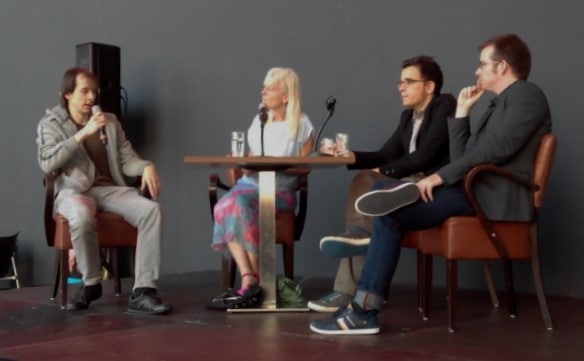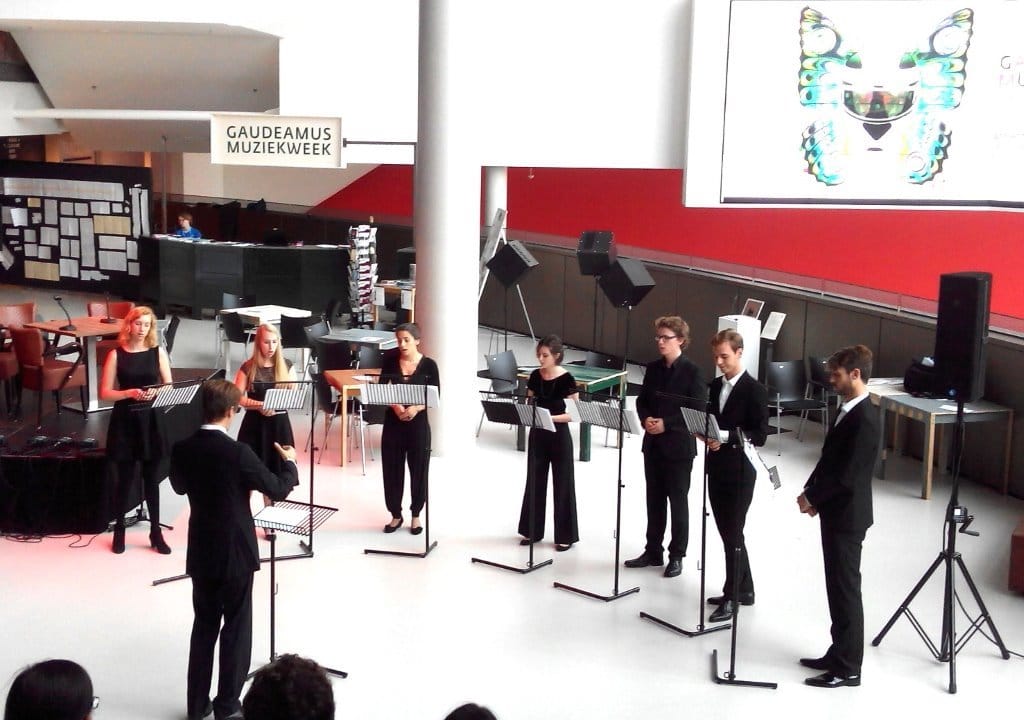Again this year, the Gaudeamus Award went to an Eastern European. In 2014, the Ukrainian Anna Korsun the coveted competition for composers under 30, this year the prize of €5,000 goes to Russian composer Alexander Khubeev* (1986, Perm). This was announced on Sunday 13 September in TivoliVredenburg by Henk Heuvelmans, for years the driving force behind the Gaudeamus Music Week. The jury report calls Khubeev 'an original and inventive composer', who 'brilliantly employs advanced techniques to generate a mysterious and profound sound world'.
The jury, consisting of Calliope Tsoupaki, Stefan Prins and Raphaël Cendo, had disagreed considerably during the selection of the five nominees, but ultimately chose the winner unanimously. This did not surprise me. While in the previous edition Anna Korsun stood head and shoulders above the other nominees, this year there was definitely no single winner. Of the five composers selected - besides Khubeev, the Greek Stylianos Dimou; the Turk Utku Asuroglu; the American Jason Thorpe Buchanan and the Hungarian Mátyás Wettl - only Khubeev and Wettl managed to present a sound of their own.

The first three presented a drab kind of modernist idiom, as was still prevalent during the just after WWII set up Ferienkurse für neue Musik in Darmstadt. Their music consists mostly of densely packed structures that lack any sense or direction and allow neither the musician nor the listener any breathing space. Against this, Wettl placed humorous pieces in the spirit of the 1960s Dadaist Fluxus movement, in which the concept is more important than the actual musical content.
At My Former Band a nine-member ensemble produces a fake waltz; in Wait a simple pop song is accompanied by four electric guitars that become increasingly out of tune. In his for ensemble in residence Slagwerk Den Haag composed Nocturne the musical material consists of nothing more than on-and-off light switches.
Khubeev managed to convince with Ghost of Dystopia, in which the conductor generates scratching and scraping sounds by controlling glass and plastic boxes with wires attached to his body, whose frequencies are amplified electronically. On Saturday night, the mysterious rustling and tinkling of a fingered, electronically amplified violin in The Whisper of Phoenix a welcome moment of calm in the concert by Utrecht-based ensemble Insomnio. Khubeev is daring, and rightly got the prize; Wettl is still a little too stuck in the concept, but his ideas are good, so we are bound to hear more from him.
Why the jury chose precisely these five composers out of almost two hundred entries is beyond me. In the fringe programming, I heard considerably fresher sounds. For instance, by the Spaniard Manuel Sanchéz García, whose Haizea-Lurra for solo flute was performed flawlessly by Ander Erburu on Saturday afternoon. Like a true Berio après la lettre, he lets the flutist explore all the possibilities of his instrument, without losing sight of the lyrical aspects.

Enchanting was the choral work Voices by the Irish composer Séan Ó Dálaigh, in which slightly dissonant harmonies and slow lines stand next to drily scanned passages. The piece is unmistakably modern, but at the same time hints at Renaissance Flemish polyphony. It was performed intensely and flawlessly by students of the Conservatorium van Amsterdam conducted by Lodewijk van der Ree.
Flemish Maya Verlaak attracted attention with a piece for cuneiform violin. She had taken this term literally and hammered four nails onto a board, which are stroked with a bow. The (upper) tones thus generated had an ethereal, almost angelic sound beauty, but Verlaak could still gain much by incorporating melodic development as well. On Sunday afternoon, drummer Brendan Faegre's ensemble impressed with lively, sometimes free jazz-like pieces by Krists Auznieks and Nick Virsi, among others. Thanks to the stimulating and surprising fringe programming, it was still a varied festival.
It is to be hoped that the jury of the next Gaudeamus Award will have more eye for adventurous composers, who dare to leave the beaten track.
*The Dutch spelling is actually Chubeev, but in order to avoid misunderstandings I, like Gaudeamus, use the English transcription.
